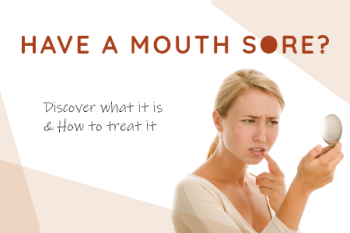Have a Mouth Sore? What is it and How to Treat it
 Almost all of us have dealt with pain in or around our mouths because of a cold sore or canker sore in our lives. But do you really know the difference between these two ailments? Here Mark J. Williamson DDS will talk about both cold sores and canker sores, and we will discuss the differences between the two.
Almost all of us have dealt with pain in or around our mouths because of a cold sore or canker sore in our lives. But do you really know the difference between these two ailments? Here Mark J. Williamson DDS will talk about both cold sores and canker sores, and we will discuss the differences between the two.
Starting with cold sores, which are clusters of blisters caused by the herpes virus type 1 or 2, and usually appear on or around the lips. Although, sometimes they can show up on the gums or on the roof of the mouth. We sometimes refer them as “fever blisters” which are filled with fluid and are very painful. Most times, the initial infection, also known as “primary herpes,” affects individuals during their teenage years, and many do not realize what they are dealing with, instead assuming they are sick with the flu. Some individuals stay very sick for a week or more because of this initial infection of the herpes virus.
When someone contracts the herpes virus, it never goes away, although it may lie dormant for long periods of time. However, when active flare-ups occur, people may have cold sores appear on the lips, gums, or roof of the mouth.
What Causes A Cold Sore Flare Up?
- Weather (heat/cold/wind)
- Sickness/Fever
- Stress
A patient can purchase numbing agents at many pharmacies and grocery stores without seeing a Dentist. These over-the-counter medications do not speed up the healing time of a cold sore, but they provide relief for any pain and discomfort the patient may experience. When one of these blisters splits open, a scab will form on the site of the sore, but normally heals within a week. Medications a dentist may prescribe will only work for a few days, and if the patient is in good health, a dentist will not write prescriptions for these medications.
When to See Your Dentist
A patient should schedule an appointment with their dentist if they experience:
* Pain or discomfort in the mouth
* Sores in the mouth, painful or not
The dentist may take a tissue sample from the sore and, via biopsy, find out what is causing the sores. This allows a dentist to ensure there is not something more severe taking place.
Next, we will talk about canker sores, which differ from cold sores.
Canker sores are in the mouth and are referred to as ulcers. Unlike cold sores, which are contagious, we cannot spread canker sores to other people. Normally, a canker sore starts as a red bump that may cause a tingling or burning sensation which often begins before a patient experiences any other symptoms.
What Causes Canker Sores?
Although no one knows exactly what causes canker sores, some symptoms can play a part in the development of these irritating sores:
* Fatigue
* Stress
* Certain Foods
* Genetics
Once a patient develops a canker sore, we recommend you avoid spicy or acidic foods and drinks as they may make the sores worse and more painful.
There are alternative methods a patient can exercise to speed up the healing process of a canker sore such as over-the-counter medications, mouth rinses that will numb and the areas in question, and also corticosteroids which come in tablet or capsule form that can help control the symptoms.
While there are multiple differences in cold sores and canker sores, if a patient notices any change in the sores, or if they do not heal within 7 to 10 days, or if the pain intensifies, the best course of action is to schedule a dentist appointment to confirm that these are not the signs of a more serious condition. Do you have questions about a mouth sore? Please call Mark J. Williamson DDS and we will be happy to help!
The content of this blog is not intended to be a substitute for professional medical advice, diagnosis, or treatment. Always seek the advice of qualified health providers with questions you may have regarding medical conditions.









